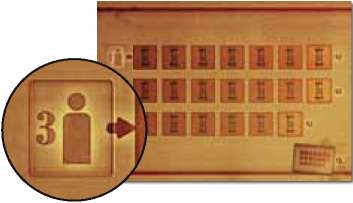
The long game of Merkator
Use the standard rules besides the changes in the game setup listed below.
With 3 or 4 players, flip the Time chart onto its backside. With 4 players, the chart is filled completely; with 3 players, just the third line is filled. With 2 players, use the ULTIMO side and fill the chart except the upper row.

This symbol (long outline) shows where to put additional Time counters for the long version of the game.
The players initially get:
- no cubes onto the Supply tile
- no Bonus cards,
- only one value 2 and one value 3 Contract
- no Time counters to make up for the starting player's advantage
With 3 or 4 players, as soon as the backside has no Time counters left, turn it over and re-fill it completely with Time counters. (Ignore the 3-player logo).
2-player Game
The 2 player game can be smoother if joining travels is banned. But your mileage may vary. To give the game even more depth (and more thinking time), don't ue coins as in the solitary version.
Expert Rules
Players have a hand limit of 1 card. During a player's turn, that player can take one of the cards that are on one of the open stacks. This might be a Bonus card, a Building card or a Contract with a value between 3 and 10.
-
The Peace of Westphalia card can never be a card held in a player's hand.
-
It is a valid tactic to take a Contract to gain access to the card below it.
-
By taking a card in hand, a player can deny other players access to this card.
Players can buy a Building card or a Bonus card from their hand during the investment step of their turn.
If a player has a Contract card in hand and fulfills a Contract of the next lower level, that player can choose to take the topmost Contract from the open stack or to take the card in hand.
Hand cards can not be discarded.
-
Having a hand card at the end of the game has no effect.
Additional Variants
-
To reduce the luck factor, ignore the loss-of-goods rule. The flip side of the Time counters then has no effect.
-
The standard rules have a cash limit of 15 Taler. This rule can be replaced by this one: Whenever a player buys a Building card, all players have to check their cash value.
If a player has enough Taler to possibly buy the most expensive Building on offer, that player immediately has to purchase one of the 4 open Building cards.
Then a new Building card is revealed and again the cash of all players (including the active player) is checked. Repeat this until no player could possibly buy the most expensive Building in the offering.
-
The Bonus cards can be revalued so that a player buying a Bonus card immediately gets 1 good of the respective kind.
-
To make it easier to optimize Contracts, add this rule: Whenever a player takes a new Contract card and the next card from the stack is revealed, any players can offer the active player coins and/or Time counters.

Lower Contract Cards
If at least 1 coin or 1 Time counter is offered, the active player may take the newly revealed Contract (plus all items offered to him) and put back the Contract he just took. No goods may be offered.
Continue Reading

